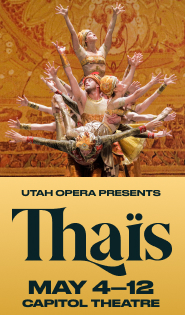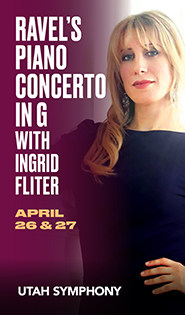Classical Music
Hagen takes over solo duties, conductor makes impressive debut with Utah Symphony
Violinist William Hagen made an unexpected but welcome appearance as soloist […]
Percussionist Currie makes a virtuosic case for Elfman concerto with Utah Symphony
Danny Elfman is best known as a prolific composer of film […]
Theater
Critic’s Choice 2023-24
Can I Say Yes to That Dress? Salt Lake Acting Company. […]
Concert review
Utah Symphony breaks a few strings with Robertson’s uneven guitar mashup
This weekend’s Utah Symphony program is a veritable feast for guitar aficionados. The brainchild of the orchestra’s creative partner conductor David Robertson, the program focuses primarily on the electric guitar, but also features two works for acoustic guitar.
The idea behind the concert undoubtedly looked good on paper, but in practice it fell somewhat short on results. While there were some interesting individual pieces, as a concept it all ended up sounding repetitive and, unfortunately, rather boring. There were also several problems with balance, to the point that the electric guitar in two works was completely drowned out by the orchestra.
The highpoint of the concert was Joaquin Rodrigo’s venerable Concierto de Aranjuez, with the South Korean guitarist JIJI as soloist.
JIJI is an engaging performer and she gave a delightfully robust reading of the work that captured the vigor of the opening movement, as well as the melancholy lyricism of the middle movement and the playfulness of the finale.
Robertson was the perfect partner for JIJI’s playing. His direction always let the soloist shine, and he crafted a nuanced accompaniment from the orchestra throughout the work. The lengthy English horn solo that opens the second movement was played with tender expressiveness by Lissa Stolz.
The only issue with this performance was that Robertson decided on utilizing the full orchestra, and consequently the guitar had to be miked to compensate for the large ensemble. Having it played as it was intended for a chamber sized orchestra without a miked guitar would have been preferable.
The concert opened with Steven Mackey’s Turn the Key. A boisterous, rhythmically dynamic piece in which each section of the orchestra tosses around different motifs, it begins in a kind of disjointed and chaotic fashion, yet everything falls neatly into place by the end. Here too Robertson created a cohesive whole with his reading the made the multitude of motifs sound seamless and logical.
One of Mackey’s graduate students, James Moore, was the electric guitar soloist in his own Sleep is Shattered.
The work received its world premiere Friday in its current version for full orchestra. In four continuous movements, each movement is distinctly atmospheric and evocative. Moore creates some interesting sound effects with his instrument throughout the work that at times juxtaposes starkly with the orchestra. But there was always a finely crafted balance between the soloist and the ensemble.
(For Saturday’s performance, Moore’s piece will be replaced by Mackey’s Aluminum Flowers for guitar and orchestra with Gretchen Menn as soloist.)
Another world premiere concerto was also on the program, by composer-guitarist Daniele Gottardo, who also soloed on electric guitar. The solo part is quite virtuosic in the outer movements of this three-movement work allowing the soloist to display his artistry.
The second movement juxtaposes lush lyricism from the guitar with turbulent outbursts from the orchestra, in an effect that is is striking and somewhat cinematic. Robertson and Gottardo struck a fine balance between the solo instrument and the ensemble.
Guitarist Joe Gore was featured on electric guitar in his and Robertson’s arrangement of several pieces from the 14th century in a suite titled Falling Through Time. The idea behind this is sound and there are some clever and interesting jazzy twists to some of the pieces. Yet the guitar was frequently drowned out by the orchestra, so with this uneven balance much of the original concept was lost.
Considerably better was Beatlerianas, an arrangement by Leo Brouwer for acoustic guitar and orchestra of several pieces by the Beatles. Included in this set were “Eleanor Rigby,” Yesterday” and “Penny Lane.” Heiko Ossig was the soloist and there was a fine connection between him and the orchestra in this suite of songs.
Closing out the concert, and yet another premiere, was Frank Zappa’s G-Spot Tornado. Originally written for synthesizer, this performance for full orchestra and seven guitarists was arranged by Ali N. Askin. The seven who soloed on electric guitars (JIJI, Mackey, Gore, Gottardo, Moore, Ossig and Menn), together with Robertson, make up the ad-hoc group titled Another Night on Earth.
The piece is a wild, rollicking ride for orchestra, with the music driven by pounding percussion. However, once again there was a huge problem with the balance between the orchestra and the soloists. They were completely overpowered by the orchestra. Had there been the perfect balance between the soloists and the ensemble this would have truly been a tornado of electrifying sound.
The program will be repeated 5:30 p.m. Saturday. utahsymphony.org
Calendar
April 26
Utah Symphony
Aziz Shokhakimov, conductor
Ingrid Fliter, pianist
[…]
Dance
Weimar-era “Green Table” proves a powerful experience in Ballet West program
With “Love and War,” Ballet West offers a triple bill of […]
“Cinderella,” Stravinsky, and premieres in the spotlight in Ballet West’s 2024-25 season
Ballet West will offer a lively array of events in its […]


